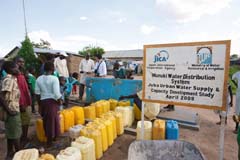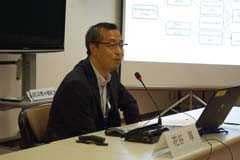First Authors' Workshop on the Comparative Study of Humanitarian Crisis Management from the Perspective of Bilateral Cooperation Agencies research project
2015.08.13
Armed conflict, large-scale natural disasters, outbreaks of infectious diseases, and other crises requiring international assistance have become more acute and complex in recent times. Because of this, humanitarian aid is undergoing rapid changes as well, including transformation of the manner in which aid is provided and diversification of organizations providing aid on the face of multiple needs.
One of the issues that have received repeated attention about assistance following crisis is what the best approach is to bridging emergency aid, rehabilitation and reconstruction, development, and prevention-usually referred to as "the continuum." Focusing on the continuum, early this year, JICA-RI initiated a research project titled Comparative Study of Humanitarian Crisis Management from the Perspective of Bilateral Cooperation Agencies. The main goal of the project is to compare the approaches of bilateral agencies in the realization of the continuum from relief to development after international humanitarian crises, identifying useful lessons at headquarters and on the operational level. The project thus includes a survey of major bilateral agencies and a series of case studies of large crises triggered by natural disasters and conflicts.

A water facility built by JICA in
South Sudan (Photo: Shinichi Kuno/JICA)
In order to kick off the case studies, the first authors' workshop was held on July 29, 2015, at the JICA Ichigaya Building.
In his opening address, JICA-RI Director Ichiro Tambo stated, "On the practical side, I have been wondering how we can achieve a continuum in the field, where aid is provided. This is an issue faced not just by JICA but by other bilateral aid agencies. As well as field application, it is my hope that this study will provide evidence for policy discussion at the UN World Humanitarian Summit to be held in Istanbul, Turkey, in 2016."

JICA-RI Executive Senior Research Fellow
Atsushi Hanatani
Heading this study are Professor Yukie Osa from Rikkyo University, director of the NPO Association for Aid and Relief Japan and JICA-RI Executive Senior Research Fellow Atsushi Hanatani. Bilateral aid donors (agencies) covered by the study include the U.S. (USAID), the U.K. (DFID), the EU (the European Commission's Humanitarian Aid and Civil Protection department, or ECHO, and the Directorate-General for International Cooperation and Development, or DG DEVCO), Australia (the former AusAID), and Japan (JICA and the Ministry of Foreign Affairs). Case studies cover long term and short term experiences in dealing with humanitarian crisis, such as Hurricane Mitch in Central America, the 2004 Indian Ocean earthquake and tsunami and Typhoon Yolanda in 2013 in the Philippines for natural hazards; conflict situations to be documented include East Timor, and the ongoing vast humanitarian crises in Syria and South Sudan.
In the workshop, the ambiguity and context-dependence of the continuum, as well as the correlation between the continuum and the interests of the beneficiaries were discussed. It was pointed out that there are some differences between USAID and DFID, which cover the full picture of international aid, and Japan and the EU, which provide assistance through several organizations and government agencies. In this respect, authors discussed strategies for comparing the donors and agencies making emphasis on their comparative advantage, in order to draw meaningful research implications. In summary, the workshop helped clarifying the common research framework and sharing ideas for the authors' upcoming field research.
The case studies are the second phase of the project, which is expected to end in a year's time. During Phase 1, a literature review and interviews were conducted at the headquarters of the bilateral aid agencies and relevant international organizations, and the results will be compiled into a JICA-RI working paper. The findings of the study will then be published as an academic publication.

事業事前評価表(地球規模課題対応国際科学技術協力(SATREPS)).国際協力機構 地球環境部 . 防災第一チーム. 1.案件名.国 名: フィリピン共和国.

事業事前評価表(地球規模課題対応国際科学技術協力(SATREPS)).国際協力機構 地球環境部 . 防災第一チーム. 1.案件名.国 名: フィリピン共和国.

事業事前評価表(地球規模課題対応国際科学技術協力(SATREPS)).国際協力機構 地球環境部 . 防災第一チーム. 1.案件名.国 名: フィリピン共和国.

事業事前評価表(地球規模課題対応国際科学技術協力(SATREPS)).国際協力機構 地球環境部 . 防災第一チーム. 1.案件名.国 名: フィリピン共和国.

事業事前評価表(地球規模課題対応国際科学技術協力(SATREPS)).国際協力機構 地球環境部 . 防災第一チーム. 1.案件名.国 名: フィリピン共和国.
scroll